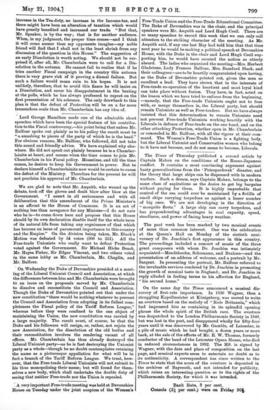The Times of Thursday published a second article by Captain
Mahan on the conditions of the Russo-Japanese conflict. It contains a most convincing argument against hasty generalisations from the 'Petropavlovsk' disaster, and the theory that large ships can be dispensed with in modern warfare. Such a dream, says Captain Mahan, belongs to the same class of aspirations as the desire to get big bargains without paying for them. It is highly improbable that control of the sea could ever be maintained by a flotilla of small ships carrying torpedoes as against a lesser number of big ones. We are not developing in the direction of "mosquito fleets." A large ship can carry torpedoes, and has preponderating advantages in coal capacity, speed, steadiness, and power of facing heavy weather.
The past week has been marked by two musical events of more than common interest. One was the celebration at the Queen's Hall on Monday of the sixtieth anni- versary of Dr. Joachim's first appearance in this country. The proceedings included a concert of music of the three great composers with whom Dr. Joachim was intimately acquainted—Mendelssohn, Schumann, and Brahms—and the presentation of an address of welcome, and a portrait by Mr. Sargent. In presenting the portrait, Mr. Balfour referred to the invaluable services rendered by Dr. Joachim in promoting the growth of musical taste in England; and Dr. Joachim in reply alluded in feeling terms to his affection for England, "his second home."


































 Previous page
Previous page